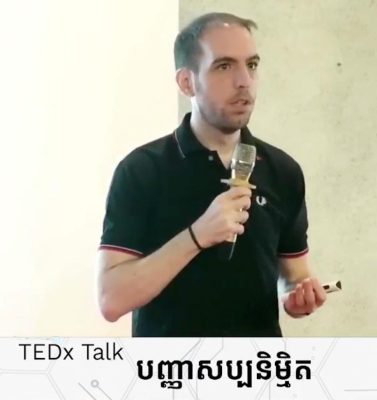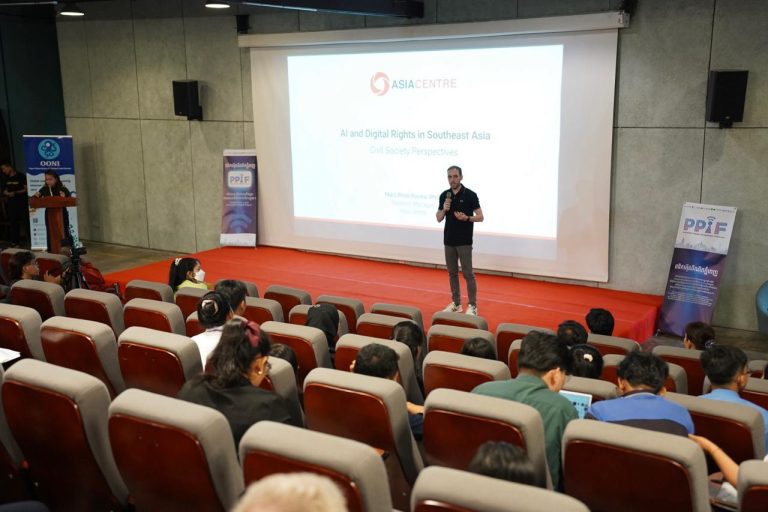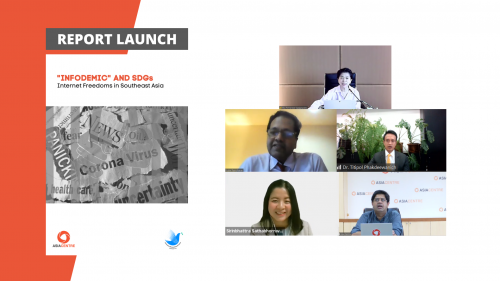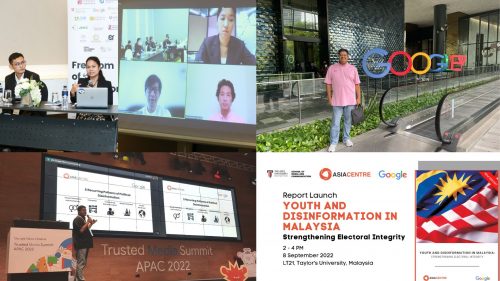On 17 October 2024, Dr Marc Pinol Rovira, Research Manager at the Asia Centre, and Somaly Kum, Research Associate at the Asia Centre, participated in the Phnom Penh Internet Forum (PPIF), held in Phnom Penh spanning from 17-18 October 2024. The forum sought to address digitalisation in Cambodia, the regulatory frameworks on cybercrime and data protection, and opportunities for Cambodia in the digital world.
More than 100 participants joined the event with representatives from government agencies like the Ministry of Agriculture, Forestry and Fisheries and the Ministry of Social Affairs Veterans and Youth Rehabilitation, INGOs, civil society organisations, the media sector, and universities.
On the first day of the event, on 17 October 2024, Somaly Kum moderated the panel discussion Cambodia’s Vision Toward Digital Transformation: Challenges and Opportunities. The panel featured two speakers. The first speaker, Lam Socheat, Executive Director at Advocacy and Policy Institute, and Pa Chanroeun, is the President of the Cambodian Institute for Democracy. The discussions highlighted concerns about the blocking of independent media outlets by private internet providers and the need for government regulations to protect internet freedoms.
Additionally, the panel addressed the lack of internet access in rural areas, emphasising the necessity for government investment in public wifi infrastructure. The conversation underscored the vital role of civil society organisations in advocating for digital transformation and ensuring that the benefits of digital technologies are accessible to all citizens.
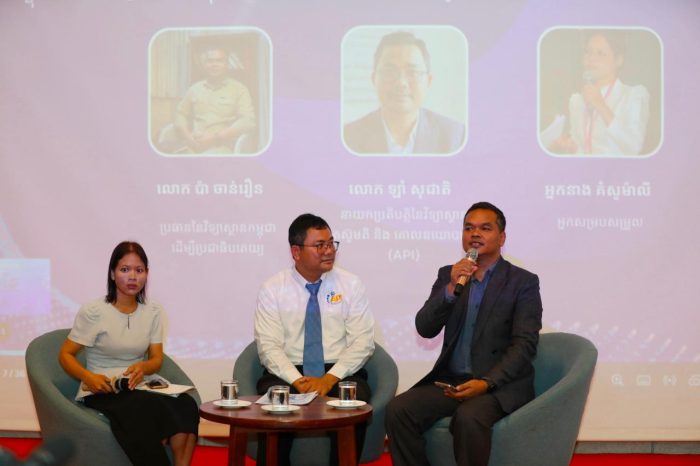
During the afternoon session, Dr Marc Pinol Rovira, presented “Artificial Intelligence and Digital Rights in Southeast Asia: Civil Society Perspectives” at the TEDx Talk session. His presentation focused on three key ideas.
First, Dr Marc Pinol Rovira highlighted that Southeast Asia—particularly Cambodia—is lagging in the adoption of AI technologies compared to other countries in the region. This delay negatively impacts Cambodia’s digital transformation, as its limited readiness prevents various stakeholders from fully benefiting from AI advancements.
Second, he emphasised the urgent need for robust legal frameworks to regulate AI, focusing on a human-centric approach that prioritises good governance and ethical considerations. He pointed out that the development of AI has largely been geared towards commercial and governmental use, leaving CSOs without adequate support.
Third, Dr Pinol Rovira underscored that the regulatory process is being predominantly led by governments and technology companies, often marginalising CSOs, despite their essential role in the digitisation process. He called for stronger collaboration between government agencies, technology firms, and CSOs to ensure a more inclusive and balanced approach to AI governance.
The presentation concluded with a round of questions and answers, during which two critical topics were discussed based on audience questions and comments.
First, there was a strong emphasis on the importance of developing a robust legal framework to regulate AI use. This framework should ensure that the opportunities presented by AI can be fully maximised while safeguarding civic freedoms for all. The need for a balanced approach that promotes innovation without compromising rights was highlighted as essential.
Second, the discussion focused on creating more opportunities for civil society organisations to actively participate in the development of AI regulations. It was noted that gathering insights from a diverse range of social groups periodically is vital to ensuring that laws remain relevant and responsive to societal needs. This would enable systematic reviews and amendments to AI regulations as necessary, ensuring a more inclusive and adaptive legal framework.
With its participation in the Phnom Penh Internet Forum 2024, the Asia Centre reinforces its work at the intersection of digital technologies and governance in Southeast Asia, particularly Cambodia. Over the past five years, the Centre has published several key baseline studies, including Internet Freedoms in Cambodia: A Gateway to Control (2021) and, more recently, Online Content Regulations in the Asia-Pacific: Limiting Civil Society’s Capacity to Hold Governments Accountable (2024) and Digital Security for High-risk Users in the Asia-Pacific: Needs Assessment Report (2024).
Acknowledging the growing importance of AI, the Asia Centre’s 10th International Conference in 2025 will focus on the impact of artificial intelligence on governance, with a particular emphasis on its effects on civil society, democracy, and media in Asia. The conference, titled AI and Governance in Asia: Civil Society, and Media, will be held in Bangkok from 20 to 22 August 2025. This event will provide a platform to explore the challenges and opportunities AI presents for governance structures, ensuring that these discussions continue to involve key regional stakeholders.
Asia Centre is a civil society research institute in Special Consultative Status with the United Nations Economic and Social Council. It serves as a knowledge partner and undertakes evidence-based research as well as provides capacity-building training for end beneficiaries. If you would like to collaborate with the Centre, please send an expression of interest to contact@asiacentre.org.
Follow Asia Centre’s social media channels for more information.

